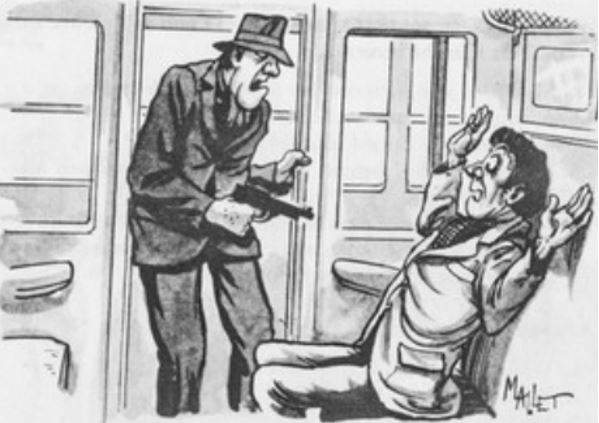
Your money or life
 المؤلف:
L.A Hill
المؤلف:
L.A Hill
 المصدر:
Advanced steps to understanding
المصدر:
Advanced steps to understanding
 الجزء والصفحة:
48-1
الجزء والصفحة:
48-1
 8/9/2022
8/9/2022
 1109
1109

It was very difficult to find jobs in the north-east of England, and when John lost his, he found it impossible to get a new one. He had soon spent all his money, so he decided to go down to the south of the country, where he had heard that things were better, and that it was easier to find work. The best way to go was by train, so he went to the railway station and got into a train which was going to London.
He was the only passenger in his compartment when another man burst in carrying a gun and said to him, 'Your money, or your life!
'I haven't got a penny, ‘John answered in fright.
"Then why are you trembling so much? The man with the gun asked angrily.
"Because I thought you were the ticket-collector, and I haven't even got a ticket,' answered John.
A Which of these sentences are true (T) and which are false (F)? Write Tor F in the boxes.
- John decided to go south because he was out of work and had no money.
- He had heard that there were more jobs to be found in southern England.
- He bought a ticket and went by train.
- A man who was sitting beside him in the train asked him for his money.
- John was trembling because he was afraid of the man's gun.
- John was trembling because he was afraid of the ticket collector.
B Answer these questions.
- Why did John leave the north-east of England? (Four reasons.)
- Why did he go south?
- What happened when he was alone in a compartment in a train?
- What did the man say?
- What did John answer?
- How did he feel?
- What did the man say then?
- And what did John answer?
C Do this puzzle.
Across:
1- Joh was alone in his ... in the train
7- Feeling unhappier because no one else is there.
8-John could not even buy a cup of....
10-365 or 366 days.
11-Usually one... a ticket before getting into a train.
13-and 1. Down. John was afraid that the man was the ......
15-The same
16- John was one in the train.
Down:
1-see 13 across.
2-John did not have any.
3-John had spent … his money.
4-John … because he was afraid.
5-When a person is hungry he … something.
6-A … goes from one place to another by car, bus train or airplane.
9-
12-‘Was John old?’ ‘No, he was …,
14-
 الاكثر قراءة في Advanced
الاكثر قراءة في Advanced
 اخر الاخبار
اخر الاخبار
اخبار العتبة العباسية المقدسة


